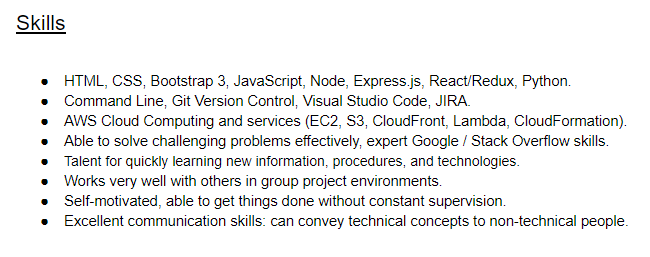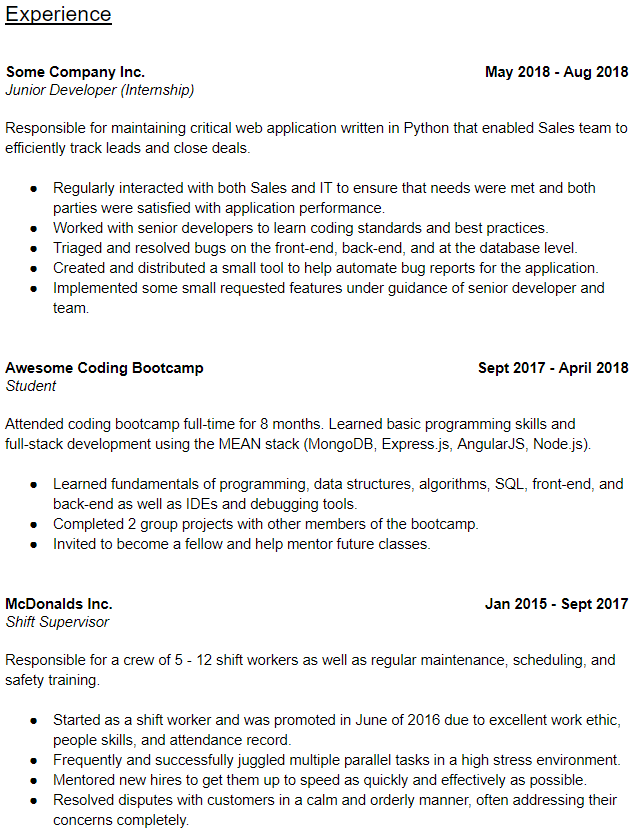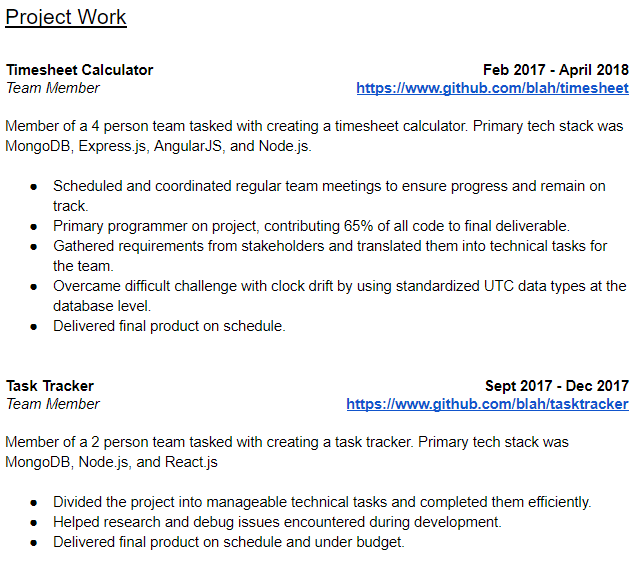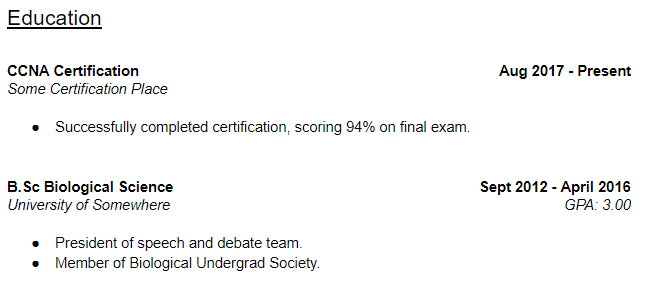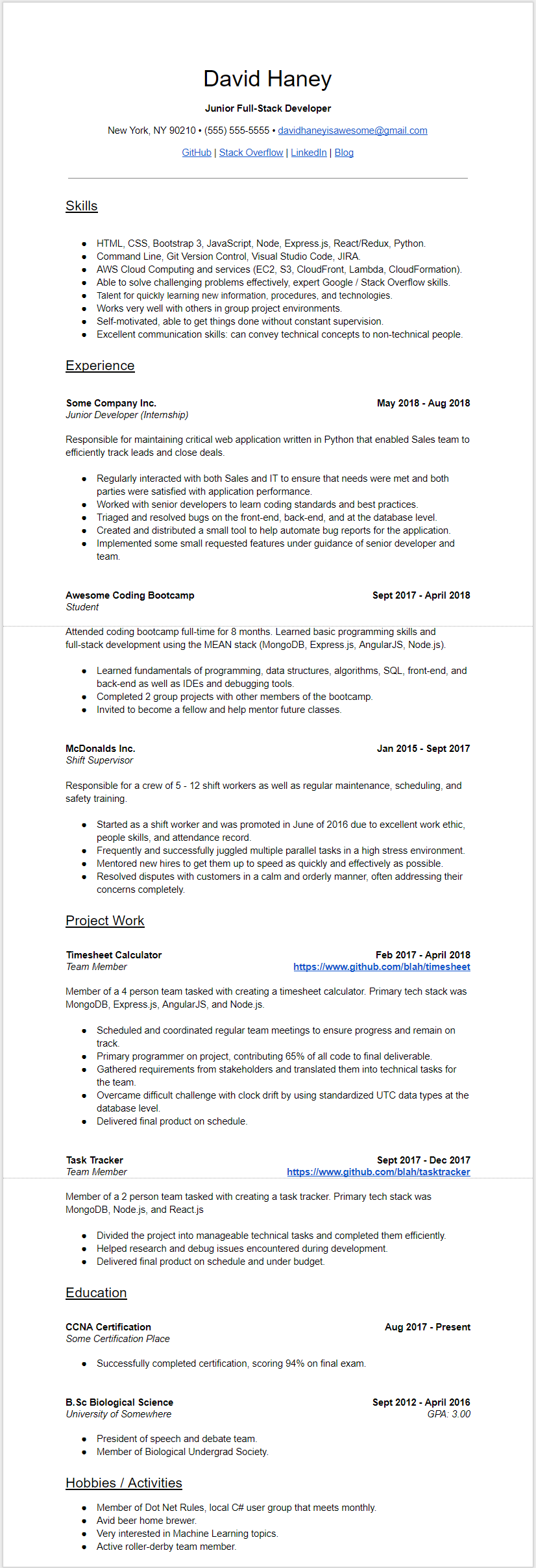A few weeks back I wrote this tweet:
I did a presentation / speaking thing last week that got me thinking: would it be useful to blog about how to build a resume as someone new to tech, from the perspective of a hiring manager? I might whip that up today or tomorrow if people like the idea.
— David Haney hachyderm.io/@haney (@haneytron) July 9, 2018
43 likes later, it’s clear to me that this topic is in-demand. So, let’s skip over the pleasantries and talk about how you can create a great technical résumé as a junior developer, from the perspective of me (a hiring manager).
So let’s dive right in! I’m going to add photos of my junior résumé here as we go as well, to give you a nice visual of what I am talking about.
Note that this article is from the perspective of a US hiring manager. International customs, norms, and laws may vary.
Before the résumé
You might think that a résumé is enough to get you hired as a junior, but often you’d be wrong. I want to see a cover letter that stands out. Write a few paragraphs to me about my company. Tailor it so that I can’t copy-paste “Acme Inc.” in over my company’s name with it still making complete sense. Show me that you want to work here. Tell me what you can offer, and why you love this company. This will immediately put you ahead of the pack.
A good cover letter goes a long way: I can assure you I’ll read it. But up next is the actual review of your skills and experience, and you need to nail that also.
Get the first few lines right
Let’s talk shop: I need the basics, and I need them now. Because you likely have little or no professional work experience, I am going to feel uncertain about you. Hiring a good junior is like throwing darts in the dark: sometimes you hit the bullseye, but often you miss entirely. Standing out in the dark is as easy as shining some light on yourself.
I don’t have time to read everybody’s entire résumé, so you’re going to put the super relevant stuff right up top, in front of my face, so that I can’t possibly overlook it while skimming your application. GitHub repo linked at the bottom? Too bad for you, I didn’t read that far. Relevant project work on page 3? Good luck getting anyone to read it. You need to show me why I should keep reading this résumé before I lose interest. Remember that I’ve likely never met you before and know nothing about you. So the first few lines of your résumé are your selling points.
Start with:
- Your full name
- Your phone number
- Your email address (don’t use an unprofessional one)
- Your mailing address (or at least state and zip / postal)
- Your current or sought after title, such as “Junior Developer”
- Relevant employment visas / status if required for the position
- Links to relevant artifacts like GitHub repos, LinkedIn profile, a blog, or Stack Overflow profile!
It should end up looking something like this:
Those few lines just gave me a ton of information that will help me decide if I want to interview you. I can use your zip code or address to assess eligibility of employment to start (I might not be able to hire internationally for example). It also helps me figure out what timezone you live in so that I don’t call you at 6am asking for an interview. Showing me the job title smack dab front and center tells me that you read my job posting and are applying for a relevant position (vs spamming every job opening you can find, and yes people do this). And the most important part is that you minimized my uncertainty about you by providing evidence (in the form of public artifacts) that give me some insight into your technical abilities and previous experience. Those Stack Overflow and GitHub links do wonders, folks.
If you can quickly make me feel very certain about you, especially compared to your competition who also applied for the job, then congratulations: you’re getting an interview.
No “objective” statements
As a hiring manager, it’s clear to me that your objective is to get a job that pays you either the same or more than you currently make, with vacation and benefits to-boot. It’s also clear to me that this job should test your skills and help you learn and grow if I want you to stick around and stay interested in the work. You don’t need to spell that out for me: I’ll figure it out in the interview(s) regardless.
Writing a paragraph about your professional objective(s) is the most common mistake that I see juniors make. It’s tacky, superfluous, and boring. It also screams “I’M BRAND NEW TO THIS!” which to me isn’t a deal breaker, but might be for other hiring managers. In hundreds of résumés I’ve never read a single objective that caught my eye or was at all interesting. Skip it entirely.
What goes next?
In order, here’s what I generally care about:
Skills
I want to see technical skills and soft skills. Can you talk to computers? Can you talk to people? Show me. Contrary to popular belief, programming is a people job. If you are the best code-slinger in the world, but you are a jerk or egotist to everybody that you work with, I will still fire you (or simply not hire you if I can detect it during the interviews).
Technical skills are fairly common in our industry; soft skills less so. Stand out by showing me that you have compassion for people and get the big picture; that programming is not just code. It will get my attention.
Work experience
Show me any relevant work history. Also show me any irrelevant history that allows you to demonstrate common work skills. Worked a crazy customer service job where you balanced 3 tasks at once all the time? Great! Write about it in the way that is focused around multitasking, being efficient, and getting things done on time and budget. I’ll eat that right up.
Try to avoid gaps in this section. If you have them, include what you did during the gap as part of the experience. It could be that you were attending school, a bootcamp, or even taking care of other family members. As discussed earlier, try to reduce uncertainty by giving lots of information.
Also try to avoid going further back than your most recent 3 experiences. Past that most managers really don’t care, and it just takes up a ton of space and makes for more reading.
Project work
Whether you taught yourself, graduated from a bootcamp, or went to college, it’s likely that you’ve completed a programming project or two with a group. Tell me about these recent projects. Most importantly: tell me about your role in the projects. Did you do the bulk of the work while others slacked? Did you coordinate assignments and deliverables? Were you the major front-end or back-end programmer? Tell me about a difficult programming challenge that came up in the project and how you solved it. All of these things give me insight into your talent and abilities.
Similar to work experience, try to keep this section to your 3 most recent projects max.
Education
Some employers value this more than others. I’m personally not terribly concerned with how or where you got your education. I’m largely concerned with figuring out whether or not you can do the job.
Include your education, whether relevant or irrelevant. Grades don’t usually matter to me, but on the other hand a 4.0 on a merit scholarship is going to get my attention in a big way. It never hurts to write down what brought you here, be it college, bootcamp, or autodidact.
Hobbies & human stuff
If I’ve read this far I am liking what I’ve seen. And we all know that work isn’t life (or at least in a healthy balance it shouldn’t be). So make my job as an interviewer easier by giving me some interesting talking points that I can use to break the ice! Tell me about your pets, your beer brewing hobby, how much you like RC cars, your model train set, your entire series 1 Pokemon card collection, anything at all! Just keep it safe for work.
Also tell me about any local user groups or events you have recently attended, or other milestones in your life that are work-relevant.
This section is a bit like playing the lottery: sometimes you’ll luck out and an interviewer will share your hobby, which will endear them to you a bit more. Plus they’re just fun to talk about with candidates when getting to know the person!
Putting it all together
Here’s what the whole thing looks like when it’s all said and done:
Try to keep your cover letter and résumé to 2 or 3 pages max. The example one which I’ve created is 2.5 pages before cover letter, and I’d say that should be about the maximum length. I once received a 23 page résumé dating back to 1988 and you can bet I didn’t even bother reading it.
Remember: quality is way more important than quantity. Sell yourself in a few words but don’t sell yourself short. And don’t be afraid to brag about yourself a little - be confident! Tell me why you’re awesome and hopefully I’ll see why also and end up hiring you. :)

